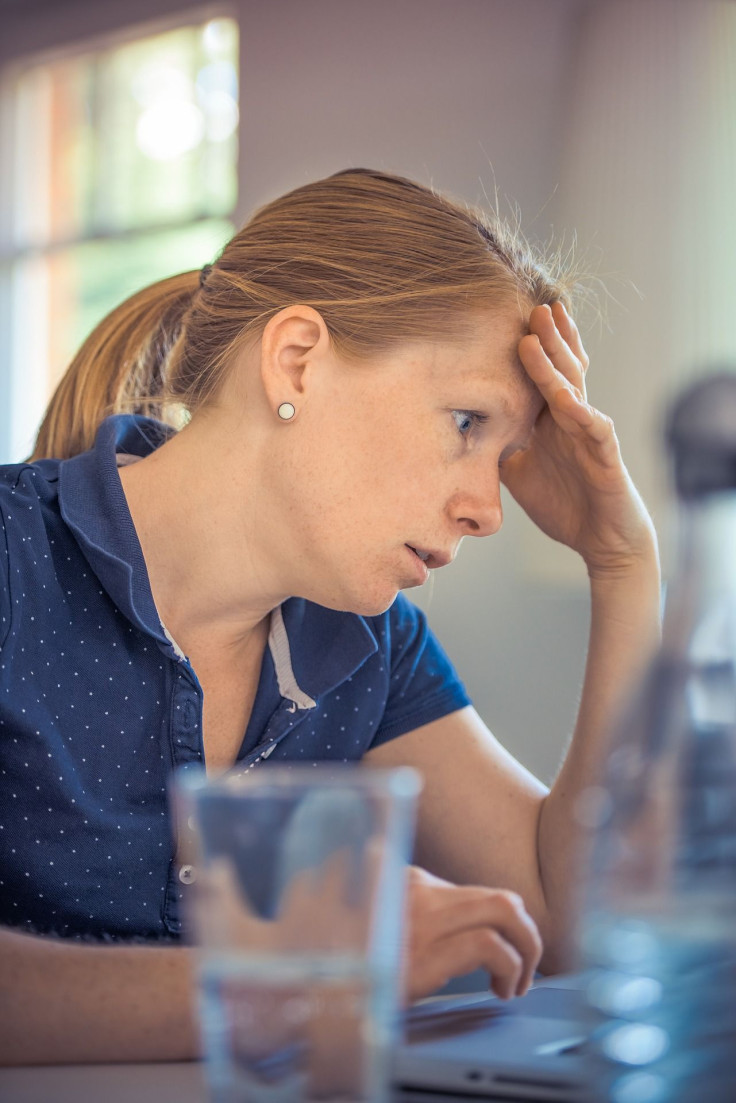8 Ways That Stress Shows On Your Face: The Aging Effects Of Anxiety

If you’re currently stressed about something — work, money or that date from two days ago you haven’t heard from — stop. You’re making yourself look old. At least according to Dr. Sanam Hafeez, Psy.D, professor at Columbia University and Founder of Comprehensive Consultation Psychological Services in New York City, who believes stress is written all over our faces.
“When someone is under stress they can appear up to 5 years older, 10 years if they don’t manage stress or make changes to their lives,” she claims. “I have seen patients end relationships or get new jobs and look 10 years younger within days. People are spending money on creams, facials and cosmetic procedures but if the stress is still there it will still show in their face,” advises Hafeez.
Here are eight ways the doctor says stress can take a toll on your face:
Dark Circles
Stress can break the fragile capillaries under your eyes, leaving you with under-eye rings and a tired appearance.
Mini Menopause
Hafeez says this isn’t proven, but some believe increased levels of the stress hormone cortisol can cause a dip in estrogen that’s similar to the decrease during menopause. Less estrogen means less collagen production which can leave your skin dull and dry.
Wrinkles
Anxiety, crying, feeling down and a lack of sleep can cause deeper lines around the eyes, forehead, eye area and mouth.
Itchiness, Flakiness Or Hives
Inflammation prompted by stress can cause rashes, rosacea, eczema and changes in skin moisture.
Under-Eye Bags
Worrying can keep you up at night, and this lack of beauty sleep causes fluid to gather in your lower eyelid area. Not only will sleep make you look better, but according to the American Psychological Association, sleeping even an hour more a night will make you feel happier.
Increased Jaw Size
Habits like teeth grinding and jaw clenching are common with stress and make muscles work overtime, leaving you with a bigger jawline and damaged teeth.
Hair Loss
When anxious, your hair follicles’ growth stage switches from active to resting. Once in the premature resting stage, it stays there for around three months, before resulting in a large amount of hair loss. Good news for women: this change usually isn't permanent, says Hafeez.
Adult Acne
Adult acne is caused by a variety of factors, including Polycystic Ovary Syndrome in women, but stress hormones can be a big reason, explains the doctor. Making it even worse, anxious people typically pick and poke at their pimples as a way to release tension.
However, this doesn't mean you'll experience all of these as stress manifests differently in everyone, Hafeez tells Medical Daily in an email. “Some people see wrinkles, changes in skin tone and texture, hair loss, acne, or eye twitching.”
Of course, avoiding stress is impossible, but chronically being anxious or worried is what causes these issues. The professor advises physical fitness, meditation, and deep breathing exercises as outlets to relieve tension.
“Those few seconds can help tremendously in that it allows time to process what is going on and that is when the mind seeks a solution,” she says. Hafeez also recommends establishing boundaries and planning personal time outs without the interference of colleagues, children or significant others.
See Also:
How Weird Nails Can Be An Indicator Of Health Problems
Why You Should Take That Nap: 5 Science-Backed Ways To Relieve Stress You'll Actually Want To Follow



























